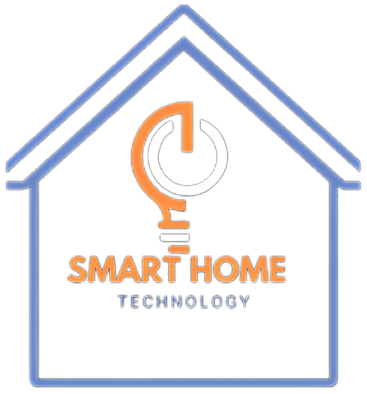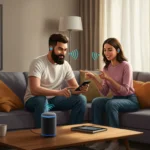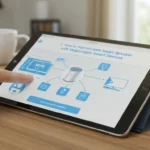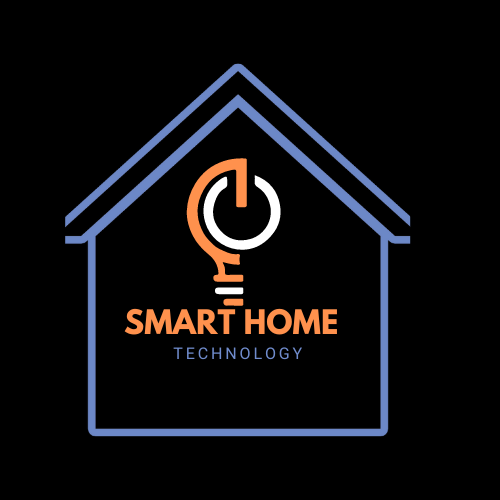Smart assistants like Alexa, Google Assistant, and Siri are convenient but pose serious privacy risks. Learn about their most significant privacy concerns and how to protect your data in 2025.

Table of Contents
Introduction
Have you ever thought your smart assistant is paying too much attention? You are not by yourself.
By 2025, smart assistants such as Siri, Google Assistant, and Alexa will significantly improve. They manage grocery lists, schedules, and even smart home appliance control. The worst part is that these voice assistants constantly listen, gather, and store information.
Additionally, such data may be exploited in ways you never intended if you are not careful. I will walk you through how smart assistants gather and utilize your data, the privacy threats they present, and the practical precautions you can take to keep yourself safe so you may enjoy your gadgets without worrying about prying eyes.
Despite what tech corporations tell us, security is not their top priority. There are actual privacy hazards, from unintentional recordings to data breaches. This article explains the main privacy issues with smart assistants and provides practical advice on protecting your personal information.
Let us get started!
How Smart Assistants Collect and Use Your Data
Imagine saying, “Hey Google, play my workout playlist!” It sounds harmless, but you might not be aware of a lot happening behind the scenes.
How Voice Commands Are Processed
- Constantly Listening: Your intelligent assistant is like a devoted personal assistant who never really “sleeps.” In order to react quickly, it is always listening for its wake word, such as “Alexa” or “Hey Siri.” But this implies that the gadget listens to noises around you even when you are not using it.
- Cloud Processing: After your assistant receives your instruction, it transmits the audio to distant computers so that sophisticated artificial intelligence algorithms may decode it. It is so intelligent because of its cloud-based processing, but it also means that your voice data is streaming to distant data centers via the internet.
- Data Storage: Many businesses save these recordings to enhance their services, which means your voice may be permanent. Imagine it as a digital footprint left by your assistant, which may be utilized to improve responses but could be abused.
The Advertising Connection
Have you ever made a casual comment and then later saw advertisements promoting the same product? It is no accident. Smart assistants frequently examine your voice data to identify patterns in your requests. You may not always give your express approval for using your information to display tailored advertisements.
Although the goal is personalizing your experience, private discussions may support focused advertising efforts.
Third-Party Risks
When you link apps like Spotify, Uber, or even a weather service to your smart assistant, your assistant may do more than just its built-in features. Although these integrations aim to improve your experience, they present new privacy threats. Should one of these third-party apps experience a security breach or fail to implement strong privacy safeguards, your information may unintentionally become public knowledge.
Interactive Tip:
Examine your smart home apps’ permissions for a moment. “Do I need to share this information with every connected service?” is a question you should ask yourself. You can protect your data by regularly auditing the apps you have connected. Have you ever wondered how “Hey Siri” or “Okay Google” causes your smart assistant to react magically? This is because these gadgets are constantly listening for their wake word.
Significant Privacy Risks of Smart Assistants
While smart assistants bring undeniable convenience, they also come with significant privacy risks. Let’s look at some of the key concerns:
1. Microphones That Listen Constantly
The always-on microphone on your assistant can occasionally record accidental chats even when you are not using it. In certain instances, an unintentional trigger recorded and distributed private conversations to contacts. These occurrences are uncommon, but they serve as a reminder that the “listening” feature occasionally crosses lines.
2. Breach of Data
No system is impenetrable to hackers. Outdated software or weak passwords can expose your smart assistant to data breaches. In these situations, hackers might exploit these flaws to unlock smart doors or snoop through your connected cameras. According to a 2023 survey, 15% of smart homes contained equipment with inadequate security configurations.
3. Government & Corporate Surveillance
In addition to commercial exploitation, government surveillance is a worry. Law enforcement may occasionally demand your voice recordings as part of their investigations. In the past, businesses have also let contractors examine anonymized recordings in an effort to enhance service quality, which presents moral dilemmas about privacy and permission.
4. Vulnerabilities of Third Parties
Your assistant’s network of third-party apps may occasionally be its weakest point. According to a 2024 study, privacy policies were insufficient for about 30% of Alexa-compatible skills. This emphasizes the importance of carefully considering the rights you give and the programs you install on your device.
Interactive Question:
Have you recently checked your smart assistant’s privacy settings again? Otherwise, it may be time to investigate what information is being exchanged and with whom.
According to a 2019 investigation, Apple and Google have human contractors listening to user recordings without the users’ consent. Your private talks may not be as private as you believe.
Third-party apps may also be vulnerable. Installing a skill or app on your smart assistant frequently exposes your data to unidentified developers; some even lack adequate security measures.

How to Protect Your Privacy When Using Smart Assistants
Protecting your privacy doesn’t mean you have to give up the convenience of smart assistants. Here are some actionable steps you can take:
1. Mute the Microphone
Consider pressing the physical mute button when you’re not using your device. For example, on an Amazon Echo, a simple press of the microphone icon can ensure that no accidental commands are recorded.
2. Tweak Privacy Settings
- Delete Recordings Regularly:
Make it a habit to review and delete your voice history. For instance, you can navigate to Alexa’s Privacy Settings to clear past recordings or use Google’s My Activity tool. - Opt-Out of Personalized Ads:
Disable personalized ads in your account settings to reduce data sharing for marketing purposes.
3. Strengthen Security Measures
- Enable Two-Factor Authentication:
Adding this extra layer of security to your smart home accounts can help safeguard your data against unauthorized access. - Use Unique Passwords:
Avoid reusing passwords across different devices and services. Consider using a password manager to keep track of secure, unique passwords.
4. Avoid Linking Sensitive Accounts
Be cautious about linking apps that contain sensitive information, such as banking or medical data. The fewer sensitive integrations, the lower the risk.
Interactive Tip:
Set a reminder once a month to audit your device settings and connected services. This simple practice ensures that only the necessary data is shared.
Future of Smart Assistant Privacy: What’s Next?
As we move into 2025, the industry is taking significant strides toward protecting user privacy. Here’s what the future might hold:
1. On-Device AI Processing
Imagine most of your voice requests being processed on the device instead of sent to the cloud. Apple’s latest Siri update processes about 90% of requests locally, which means less data leaves your home. Google and Amazon are also working on reducing cloud dependency, which could significantly enhance your privacy.
2. Stricter Regulations
New privacy laws, such as the Global Data Protection Act (2025), are starting to require explicit consent for collecting and using voice data. These regulations give users more control and allow legal recourse if their data is mishandled.
3. Open-Source Alternatives
Alternatives to popular innovative assistant platforms, like Mycroft and Home Assistant, are starting to appear. You are in charge of your privacy with these open-source options, which provide many of the same benefits without the same degree of data tracking.
Interactive Question:
What would you prefer: a device that processes 90% of your data on-device or one that sends most of your data to the cloud? Share your thoughts!
The good news? There is a growing worry about privacy issues with smart assistants. As tech businesses move toward on-device processing, cloud servers will not need to receive voice commands. For example, Apple’s most recent AI models are made to manage more demands directly on the device. In the long term, this can result in less data collection.
Governments are intervening as well. Thanks to privacy regulations like the CCPA and GDPR, businesses are under pressure to be more open about how they acquire data. Even stronger restrictions may give users more control over their information.
What Are the Privacy Concerns of Smart Devices?

While smart assistants often steal the spotlight, other smart devices in your home—like TVs, cameras, and thermostats—also collect data. Here’s what to keep in mind:
- Unencrypted Data: Your video feeds could be intercepted because some low-cost security cameras send data without encryption.
- Location tracking: Your smartphone and many smart devices may unintentionally share your location information and expose your everyday routines.
- Over-Collection: Wearable technology and smart refrigerators may gather more data than is required, adding to an excessive digital footprint.
Reflective Thought:
Consider the balance between convenience and privacy—do you need every appliance in your home connected to the Internet?
What Are the Privacy Issues with Virtual Assistants?
Virtual assistants are evolving, and with that evolution come new privacy challenges:
- Voice Spoofing:
With advances in AI, it’s becoming increasingly possible for artificial voices to mimic your own, potentially tricking your devices into taking unauthorized actions. - Biometric Data Risks:
Your distinct voice might be a biometric identification. If hacked, this voiceprint may be hard or impossible to recover—you can not just reset your voice like you can with a password.
Interactive Tip:
Keep an eye on industry updates regarding biometric security. Staying informed can help you understand and mitigate these emerging risks.
Is Google Assistant Safe for Privacy?
Google Assistant employs robust encryption and strong security protocols, but its integration with your Google Account means that much of your data is centralized. This centralization can make it easier for targeted ads and data aggregation:
- Activity Logs:
Deleting your activity logs helps limit the amount of data stored over time. - Using a Dummy Account:
Some users create a separate account exclusively for their smart home devices to minimize the personal data linked to their primary account.
Interactive Question:
Do you feel comfortable with the amount of data collected by Google Assistant? What steps do you take to manage your digital footprint?
Smart Assistant Privacy Features (2025)
| Feature | Amazon Alexa | Google Assistant | Apple Siri |
| On-Device Processing | Limited | Partial | Yes (90%) |
| Auto-Delete Recordings | 3-18 Months | 3-18 Months | 1 Month |
| Third-Party App Vetting | Moderate | Moderate | Strict |
| Open-Source Alternatives | No | No | No |
Conclusion
Despite their convenience, smart assistants pose significant privacy hazards. Unintentional recordings and data breaches can make your personal information more vulnerable than you may realize.
Fortunately, you have some power. You may protect your data without sacrificing the convenience of a smart assistant by adjusting settings, removing recordings, and restricting app connections.
Therefore, spend a few minutes now auditing your privacy settings and making the necessary adjustments. You will be appreciative in the future.
FAQs
Can smart assistants listen to me even when I don’t say the wake word?
Yes, they can be accidentally triggered, leading to unintended recordings. It’s best to mute the microphone when not in use.
How can I delete my smart assistant’s voice recordings?
Go into your device settings (Alexa, Google Assistant, Siri) and find the option to delete stored recordings. You can also set automatic deletion.
Are smart assistants safe for banking and passwords?
Not recommended. Hackers can gain access, and voice commands can be intercepted. Use a secure password manager instead.
Do smart assistants sell my data?
Companies claim they don’t sell data but use it for ad targeting and AI training.
Can hackers take control of my smart assistant?
Yes, if your accounts are not secured. Use strong passwords and enable two-factor authentication.



